Related Research Articles

The Office of Strategic Services (OSS) was an intelligence agency of the United States during World War II. The OSS was formed as an agency of the Joint Chiefs of Staff (JCS) to coordinate espionage activities behind enemy lines for all branches of the United States Armed Forces. Other OSS functions included the use of propaganda, subversion, and post-war planning.

Allen Welsh Dulles was an American lawyer who was the first civilian Director of Central Intelligence (DCI), and its longest serving director to date. As head of the Central Intelligence Agency (CIA) during the early Cold War, he oversaw the 1953 Iranian coup d'état, the 1954 Guatemalan coup d'état, the Lockheed U-2 aircraft program, the Project MKUltra mind control program and the Bay of Pigs Invasion in 1961. As a result of the failed invasion of Cuba, Dulles was fired by President John F. Kennedy.

William Joseph "Wild Bill" Donovan was an American soldier, lawyer, intelligence officer and diplomat. He is best known for serving as the head of the Office of Strategic Services (OSS), the precursor to the Bureau of Intelligence and Research and the Central Intelligence Agency (CIA), during World War II. He is regarded as the founding father of the CIA, and a statue of him stands in the lobby of the CIA headquarters building in Langley, Virginia.
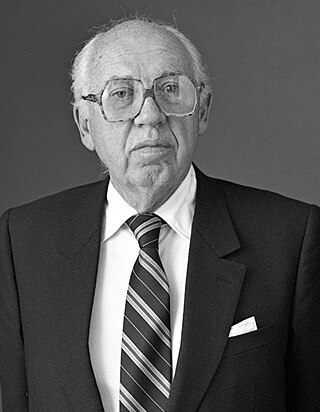
William Joseph Casey was an American lawyer who was the Director of Central Intelligence from 1981 to 1987. In this capacity he oversaw the entire United States Intelligence Community and personally directed the Central Intelligence Agency (CIA).

The director of central intelligence (DCI) was the head of the American Central Intelligence Agency from 1946 to 2004, acting as the principal intelligence advisor to the president of the United States and the United States National Security Council, as well as the coordinator of intelligence activities among and between the various US intelligence agencies.
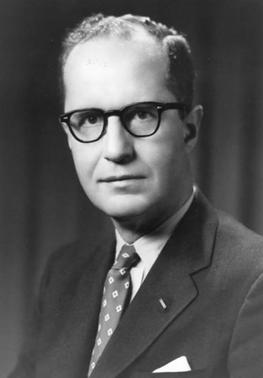
Kermit "Kim" Roosevelt Jr. was an American intelligence officer who served in the Office of Strategic Services during and following World War II. A grandson of Theodore Roosevelt, the 26th President of the United States, Roosevelt went on to establish American Friends of the Middle East and then played a lead role in the CIA's efforts to overthrow Mohammad Mosaddegh, the democratically elected Majlis-appointed prime minister of Iran, in August 1953.
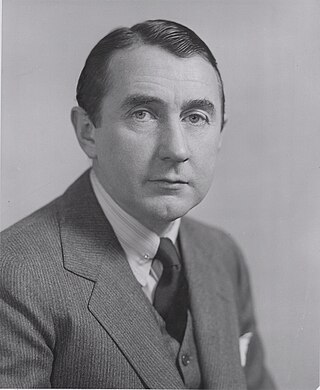
William Harding Jackson was a U.S. civilian administrator, New York lawyer, and investment banker who served as Deputy Director of the Central Intelligence Agency. Jackson also served briefly under President Dwight D. Eisenhower as Acting United States National Security Advisor from 1956 to 1957.
Lt. Col. Duncan Chaplin Lee (1913–1988) was a confidential senior assistant to Maj. Gen. William Donovan, founder and director of the Office of Strategic Services (OSS), World War II-era predecessor of the CIA, between 1942 and 1946. Lee has posthumously been identified by the Venona project as the NKVD mole inside the OSS with the code name "Koch," making Lee the most senior alleged spy the Soviet Union ever recruited inside the U.S. intelligence community.
Noel Haviland Field was an American diplomat who was accused of being a spy for the NKVD. His name was used as a prosecuting rationale during the 1949 Rajk show trial in Hungary, as well as the 1952 Slánský show trial in Czechoslovakia. Much controversy surrounds the Field story. In 2015, the historian David Talbot reignited claims that Field was set up by Allen Dulles in order to create paranoia designed to undermine the Soviet Union.
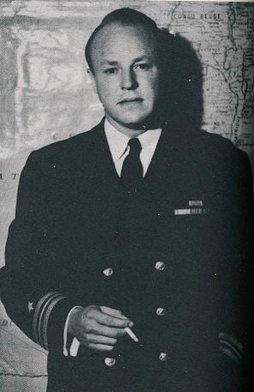
Frank Gardiner Wisner was one of the founding officers of the Central Intelligence Agency (CIA) and played a major role in CIA operations throughout the 1950s.

Operation Sunrise was a series of World War II secret negotiations from February to May 1945 between representatives of Nazi Germany and the United States to arrange a local surrender of German forces in northern Italy. Most of the meetings took place in the vicinity of Bern, Switzerland, and the lead negotiators were Waffen-SS General Karl Wolff and American OSS agent Allen Dulles. The meetings provoked Soviet suspicion that the Americans were seeking to sign a separate peace with the Germans and led to heated correspondence between Joseph Stalin and Franklin Roosevelt, an early episode of the emerging Cold War.

David Kirkpatrick Este Bruce was an American diplomat, intelligence officer and politician. He served as ambassador to France, the Federal Republic of Germany, and the United Kingdom, the only American to be all three.
Cord Meyer IV was a war veteran, a world federalist, a CIA official and a writer. After serving in World War II as a Marine officer in the Pacific War, where he was both injured and decorated, he led the United World Federalists in the years after the war. Around 1949, he began working for the CIA, where he became a high-level operative, retiring in 1977. After retiring from intelligence work in 1977, Meyer wrote as a columnist and book author.

The Central Intelligence Agency (CIA), known informally as the Agency, metonymously as Langley and historically as the Company, is a civilian foreign intelligence service of the federal government of the United States tasked with gathering, processing, and analyzing national security information from around the world, primarily through the use of human intelligence (HUMINT) and conducting covert action through its Directorate of Operations. The agency is headquartered in the George Bush Center for Intelligence in Langley, Virginia.
At various times, under its own initiative or in accordance with directives from the President of the United States or the National Security Council staff, the Central Intelligence Agency (CIA) has attempted to influence public opinion both in the United States and abroad.
The Dulles–Jackson–Correa Report was one of the most influential evaluations of the functioning of the United States Intelligence Community, and in particular, the Central Intelligence Agency (CIA). The report focused primarily on the coordination and organization of the CIA and offered suggestions that refined the US intelligence effort in the early stages of the Cold War.
The Eberstadt Report, officially known as the Task Force Report on National Security Organization, was a study conducted by the United States government which evaluated the structure and operations of the United States Department of Defense and United States Intelligence Community. The report was created by the Task Force on National Security Organization, chaired by Ferdinand Eberstadt, from 1948–49 under the Commission on Organization of the Executive Branch of the Government, also known as the First Hoover Commission. The most important findings of the report include recommendations for better cooperation within the US Intelligence Community, improvement in the internal structure and operations of the Central Intelligence Agency (CIA), and the growing need for the development of scientific intelligence in the background of the Cold War. Despite its submission to US Congress, the report was not widely read due to being overshadowed by the Intelligence Survey Group and its report, the Dulles Report.
The Pond was a small, secret organization formed by the government of the United States which operated between 1942 and 1955. It engaged in espionage. It was formally acknowledged by the US government in 2001.
The Report on the Covert Activities of the Central Intelligence Agency is a 69-page formerly classified comprehensive study on the personnel, security, adequacy, and efficacy of the Central Intelligence Agency written by Lieutenant General James H. Doolittle. United States President Dwight Eisenhower requested the report in July 1954 at the height of the Cold War and following coups in Iran and Guatemala. The report compares with other contemporary Cold War documents such as George Kennan's "X" article in Foreign Affairs, which recommended a policy of "containment" rather than direct confrontation with the Soviet Union, and NSC 68, the secret policy document produced in 1950, which recommended a similarly restrained policy of “gradual coercion.” Doolittle wrote with an abandon-all-principles approach that conveyed the national fear that the United States faced the prospect of annihilation at the hands of the Soviet Union: “It is now clear that we are facing an implacable enemy whose avowed objective is world domination by whatever means and at whatever cost,” Doolittle wrote. “There are no rules in such a game… If the United States is to survive, long standing concepts of ‘fair play’ must be reconsidered.” Doolittle’s forceful policy and language reflected the fear that motivated American citizens and policymakers in the wake of Soviet Communism.
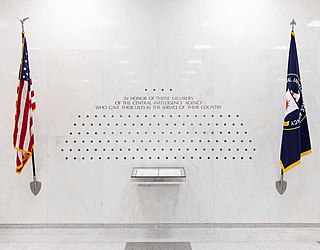
The United States Central Intelligence Agency (CIA) dates from September 18, 1947, when President Harry S. Truman signed the National Security Act of 1947 into law. A major impetus that has been cited over the years for the creation of the CIA was the unforeseen attack on Pearl Harbor, but whatever Pearl Harbor's role, at the close of World War II government circles identified a need for a group to coordinate government intelligence efforts, and the Federal Bureau of Investigation (FBI), the State Department, the War Department, and even the Post Office were all jockeying for that new power.
References
- 1 2 3 4 5 Evans-Pritchard, Ambrose (2000-09-19). "Euro-federalists financed by US spy chiefs". Telegraph. Retrieved 2008-10-15.
- 1 2 Aldrich, Richard - OSS, CIA and European Unity: The American Committee on United Europe 1948-60. Diplomacy & Statecraft. 1 March 1997
- ↑ Wilford, Hugh (2013). The CIA, the British Left and the Cold War: Calling the Tune? Studies in Intelligence. Routledge. pp. 227–228. ISBN 978-1135294779.
- ↑ Giles Scott-Smith, Hans Krabbendam, The Cultural Cold War in Western Europe, 1945-1960 p.46, Roosevelt Study Center.